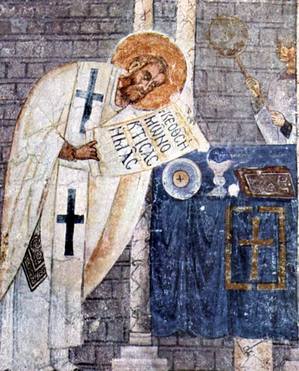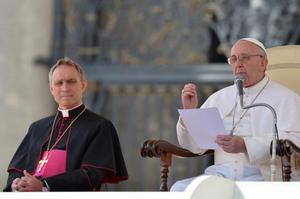I came across a portion of Saint Basil the Great’s Letter 90 addressed to the bishops of the West. I like reading these types of letters because they give a great sense of the history of Christian salvation history. In 2000 years we’ve been exposed to some things more than once. Apparently, Basil is responding to reports of some members of the Church allowing certain influences of society, politics, and unorthodox teaching of the Faith to enter into, to penetrate, the life of the Holy Church. What came to mind was the phrase of Pope Francis a couple of months ago when he warned the Church about theological narcissism. It’s not all about me! There are times when a Christian can be too cozy with the culture in which he or she lives.
Saint Basil isn’t writing today, he inhabits the 4th century. His words, though, are timeless; his description of the currents are applicable today. It makes no sense to me to merely identify the problems of today without saying that the change can’t applied to all others and not be a provocation to my own conversion. Reform is not the responsibility of all others, but conversion of mind and heart is also my own spiritual work before the Divine Majesty.
The zeal for true religion that Basil wants to propose is two fold: the work of God acting in the world today, and our sharing what we have received from Jesus Christ. Zeal for the Kingdom is about God’s work, not my own; it is God’s creation, God’s Church, God’s people –not mine. Basil is rejecting a theological narcissism. Isn’t that what we face today? The faith we’ve been given by the Lord is transferred to the life of the Church, as another “Great” once said, Saint Leo. As the Lord Himself turns toward the Father in prayer, so must our orientation be set on the Trinity.
The doctrines of the Fathers are despised; apostolic traditions are set at nought; the devices of innovators are in vogue in the Churches; now men are rather contrivers of cunning systems than theologians; the wisdom of this world wins the highest prizes and has rejected the glory of the cross. Shepherds are banished, and in their places are introduced grievous wolves hurrying the flock of Christ. Houses of prayer have none to assemble in them; desert places are full of lamenting crowds. The elders lament when they compare the present with the past. The younger are yet more to be shown compassion, for they do not know of what they have been deprived. All this is enough to stir the pity of men who have learned the love of Christ; but, compared with the actual state of things, words fall very far short. If then there be any consolation of love, any fellowship of the Spirit, any bowels of mercy, be stirred to help us. Be zealous for true religion, and rescue us from this storm. Ever be spoken among us with boldness that famous dogma of the Fathers, which destroys the ill-famed heresy of Arius, and builds up the Churches in the sound doctrine wherein the Son is confessed to be of one substance with the Father, and the Holy Ghost is ranked and worshipped as of equal honor, to the end that through your prayer and co-operation the Lord may grant to us that same boldness for the truth and glorying in the confession of the divine and saving Trinity which He has given you.


